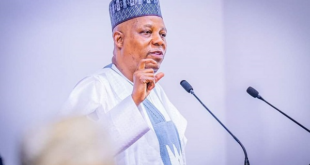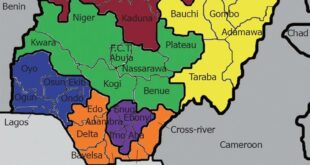The nationwide strike by the Nigerian Labour Congress, NLC, and Trade Union Congress of Nigeria, TUC, over the hike in fuel prices and electricity tariffs by the federal government met with different responses across the states on Wednesday. Some states witnessed a total shutdown of banks, public schools, courts, and other public places, while some states had partial compliance and others did not comply at all.
The strike was effective in Lagos, Anambra, Abia, Ebonyi, Kebbi, and Edo, among others, where workers obeyed the directives of the two labour bodies.
In Kano, banks and schools were closed, and the government suspended qualifying examinations. Schools were also closed in Osogbo, the capital of Osun State, and the police increased security to prevent any breakdown of law and order.
In Imo, there was partial compliance as banks opened for business.
However, workers ignored the strike in Enugu and Abuja, where labour leaders said they would enforce the strike in the Federal Capital Territory, FCT, today.
The two unions at the public universities in the country disagreed over the strike. The Academic Staff Union of Universities, ASUU, asked its members to join the strike, while the Congress of University Academics, CONUA, told its members to shun the action.
The Organised Labour dismissed the claims by the Special Adviser to President Bola Tinubu on Information and Strategy, Bayo Onanuga, that the strike was an ego trip meant to ‘blackmail the government.’ It insisted that the strike was not a personal matter affecting the NLC President, Joe Ajaero, as alleged.
The National Executive Council, NEC, meeting of the labour unions in Abuja on November 13, 2023, decided to embark on the strike due to the alleged failure of the Federal Government to address issues affecting workers such as the minimum wage, insecurity, corruption, and poor governance.
The unions also said they had made some demands, which the government allegedly failed to meet following the recent crisis in Imo that resulted in the brutalization of Ajaero and other members of the labour unions.
Some of the grievances of organised labour include unpaid salary arrears, an unfair declaration of 11,000 workers as ghost employees, unsettled gratuities, non-compliance with the N30,000 minimum wage act, and the declaration of 10,000 pensioners as ghost retirees.
The Federal Government on November 13 warned the unions against going ahead with the planned strike, saying it would amount to contempt of court.
The Attorney-General of the Federation and Minister of Justice, Mr. Lateef Fagbemi, SAN, said in a statement that the government had obtained a restraining order from the National Industrial Court of Nigeria barring the unions from proceeding with the strike.
Labour leaders expressed satisfaction with the level of compliance on the first day, noting that the compliance level would be better in the next few days.
Some of the major critical sectors that fully complied with the strike were workers in the maritime sector who shut the port formations in Lagos, Rivers, Cross River, and Delta states.
The Maritime Workers Union of Nigeria (MWUN), in compliance with the Labour Directive, stopped port operations at Apapa and Tin-Can Island.
Freight forwarders appealed to the Minister of Marine and Blue Economy and the management of the Nigerian Shippers Council, NSC, to ensure that terminal operators and shipping lines do not charge demurrage on them for the duration of the strike.
Workers in the food, beverage, and tobacco, chemical and non-metallic products, and construction sectors also fully complied.
Subscribe to the Advocate News letter and receive news updates daily in your inbox.
 Advocate.ng Latest news update on politics, entertainment, sport and more
Advocate.ng Latest news update on politics, entertainment, sport and more




